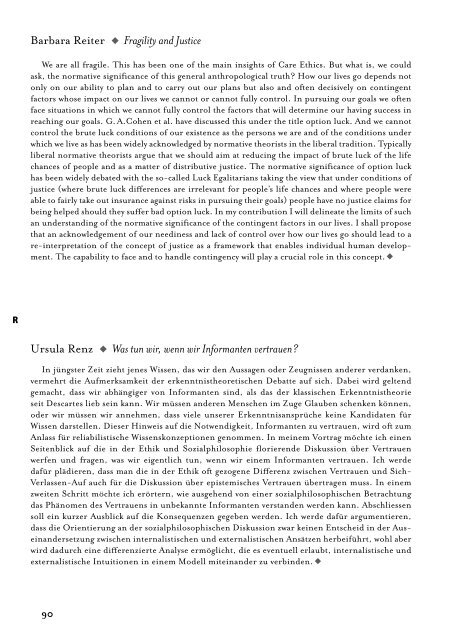Verlag.Buchhandel.Service. - Österreichische Gesellschaft für ...
Verlag.Buchhandel.Service. - Österreichische Gesellschaft für ...
Verlag.Buchhandel.Service. - Österreichische Gesellschaft für ...
Erfolgreiche ePaper selbst erstellen
Machen Sie aus Ihren PDF Publikationen ein blätterbares Flipbook mit unserer einzigartigen Google optimierten e-Paper Software.
R<br />
Barbara Reiter ◆ Fragility and Justice<br />
We are all fragile. This has been one of the main insights of Care Ethics. But what is, we could<br />
ask, the normative significance of this general anthropological truth? How our lives go depends not<br />
only on our ability to plan and to carry out our plans but also and often decisively on contingent<br />
factors whose impact on our lives we cannot or cannot fully control. In pursuing our goals we often<br />
face situations in which we cannot fully control the factors that will determine our having success in<br />
reaching our goals. G. A.Cohen et al. have discussed this under the title option luck. And we cannot<br />
control the brute luck conditions of our existence as the persons we are and of the conditions under<br />
which we live as has been widely acknowledged by normative theorists in the liberal tradition. Typically<br />
liberal normative theorists argue that we should aim at reducing the impact of brute luck of the life<br />
chances of people and as a matter of distributive justice. The normative significance of option luck<br />
has been widely debated with the so-called Luck Egalitarians taking the view that under conditions of<br />
justice (where brute luck differences are irrelevant for people’s life chances and where people were<br />
able to fairly take out insurance against risks in pursuing their goals) people have no justice claims for<br />
being helped should they suffer bad option luck. In my contribution I will delineate the limits of such<br />
an understanding of the normative significance of the contingent factors in our lives. I shall propose<br />
that an acknowledgement of our neediness and lack of control over how our lives go should lead to a<br />
re-interpretation of the concept of justice as a framework that enables individual human development.<br />
The capability to face and to handle contingency will play a crucial role in this concept. ◆<br />
Ursula Renz ◆ Was tun wir, wenn wir Informanten vertrauen?<br />
In jüngster Zeit zieht jenes Wissen, das wir den Aussagen oder Zeugnissen anderer verdanken,<br />
vermehrt die Aufmerksamkeit der erkenntnistheoretischen Debatte auf sich. Dabei wird geltend<br />
gemacht, dass wir abhängiger von Informanten sind, als das der klassischen Erkenntnistheorie<br />
seit Descartes lieb sein kann. Wir müssen anderen Menschen im Zuge Glauben schenken können,<br />
oder wir müssen wir annehmen, dass viele unserer Erkenntnisansprüche keine Kandidaten <strong>für</strong><br />
Wissen darstellen. Dieser Hinweis auf die Notwendigkeit, Informanten zu vertrauen, wird oft zum<br />
Anlass <strong>für</strong> reliabilistische Wissenskonzeptionen genommen. In meinem Vortrag möchte ich einen<br />
Seitenblick auf die in der Ethik und Sozialphilosophie florierende Diskussion über Vertrauen<br />
werfen und fragen, was wir eigentlich tun, wenn wir einem Informanten vertrauen. Ich werde<br />
da<strong>für</strong> plädieren, dass man die in der Ethik oft gezogene Differenz zwischen Vertrauen und Sich-<br />
Verlassen-Auf auch <strong>für</strong> die Diskussion über epistemisches Vertrauen übertragen muss. In einem<br />
zweiten Schritt möchte ich erörtern, wie ausgehend von einer sozialphilosophischen Betrachtung<br />
das Phänomen des Vertrauens in unbekannte Informanten verstanden werden kann. Abschliessen<br />
soll ein kurzer Ausblick auf die Konsequenzen gegeben werden. Ich werde da<strong>für</strong> argumentieren,<br />
dass die Orientierung an der sozialphilosophischen Diskussion zwar keinen Entscheid in der Auseinandersetzung<br />
zwischen internalistischen und externalistischen Ansätzen herbeiführt, wohl aber<br />
wird dadurch eine differenzierte Analyse ermöglicht, die es eventuell erlaubt, internalistische und<br />
externalistische Intuitionen in einem Modell miteinander zu verbinden. ◆<br />
90


